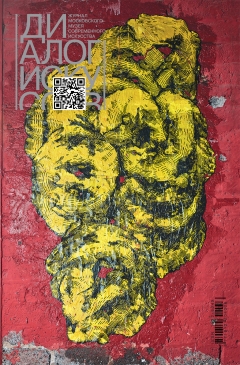Taus Makhacheva, in collaboration with Super Taus, is opening an exhibition in MMOMA titled “Cloud Caught on a Mountain”. A cloud is something intangible, where landscape and phantasies meet giving birth to large and small artworks. Konstantin Agunovich talked to the artist to get the general picture behind the exhibition.
|
|
Konstantin Agunovich. Last year Super Taus took part in an exhibition at the Center Pompidou. This certainly played a role in you being invited to the main pro- ject of the Venice Biennale. Why did not you bring Super Taus to Venice?
Taus Makhacheva. I realized that Venice was not the right context for Super Taus to appear. Because the humour would be over the top. The work would turn into fun, amusement and a great deal would be lost by transforming it into a spectacle, a traveling circus.
KA. It must be annoying to carry along with you a character after it has been created.
TM. I am not carrying her along with me. She lives her own life in the mountains in Dagestan where she teaches at a kindergarten. Trained as a philologist, she has a family and has been building a house with the money from the Kandinsky Prize. Sometimes when I feel exhausted I call on her to help me.
KA. Some of your works deal with tracing viewers’ reactions to them. Where is art here? Is it that you provoke them or that you track their responses?
TM. In fact I do not observe viewers but deliberately create open-ended situations. It is always about setting up situations with different types of questions. For example, the project shown at the VAC Foundation in Venice titled “Stomach It” was about the history of Holodomor [the mass starvation in Ukraine in 1932-33]. I produced an artist’s menu: a loudspeaker playing the sound of an empty stomach, a balloon with water, bread vouchers printed on edible paper, a saucepan giving off the odor of greasy soup which a perfumer made for me. Also there was coal that you could exchange for diamonds.
I came across a story about a family in the 1930s in Dagestan who survived only because their grandmother had diamonds that she would exchange for coal and bread. There is no narrative here nor a conclusion I want the viewer to reach. There are only some reminders that can take us back to the field of collective memory.
KA. Are you tempted to control the perception and interpretations of your works, to reformulate and refine in hindsight the message behind them?
TM. It has been a while now that I have given up trying to control all the meanings that I put into an artwork. I am very comfortable relinquishing this control to the viewer. Regarding refinement I always have the urge to improve something. But at some point I just force myself not to touch the work. You have to make yourself realize that a work from 2012 belongs to 2012.
KA. Now you have a retrospective exhibition...
TM. This word unnerves me. Thirty four is a bit young for a retrospective. It is just that a body of works that I have never shown in Moscow has built up: “Gamsutl”, “Tightrope”, “Baida”. Also my food-related practices have never been presented here. If we put aside the question of age and the like, I guess a retrospective is a variation on the collective exhibition. I am not an artist who suits large solo shows. My pieces work better in a collective, among other messages. This is probably why I have been invited there.
KA. Tell us about the symposium of superheroes. What is it about?
TM. A real-life conference. Attended by comic strip researchers; there will also be superheroes. For example, fantastic Cleanman from Chelyabinsk who simply cleans the streets and makes videos about it. Super Taus will probably also be there. In India there is a village where people make films about a superhero using only the material available to them. So they hold him high in the air making him appear as though he is flying. These are stories from different worlds – the first, third, tenth. I am more and more convinced that these are equally important fields of knowledge.




